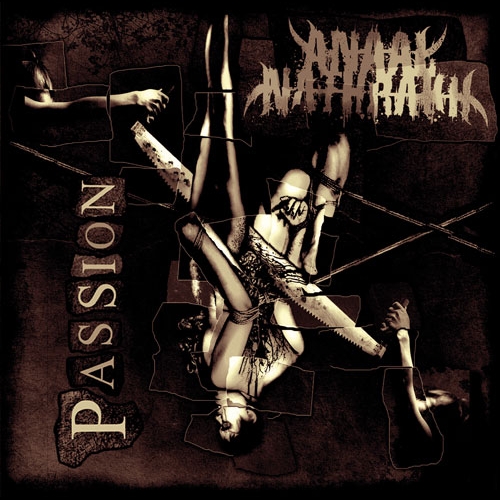
(Our UK contributor Andy Synn provides the following review of Anaal Nathrakh’s forthcoming album, Passion. This is our first of two reviews of the album — the second, by your humble editor, is in the post above Andy’s. Some albums just demand extra attention.)
Passion is one thing that Anaal Nathrakh have never lacked, as their instrumental work is as frenzied and violent as one would expect and the terrifying vocals of Dave Hunt remain as overwhelmingly powerful as ever. But the word has other meanings as well, invoking images of suffering and martyrdom which seem appropriate given the harrowing atmospheres and inhuman cacophony the band conjure, as well as the lyrical bent of certain songs, whose themes of anarchy, dedication and personal desolation are perfectly captured by such a simple, yet complex, term.
The sheer, unadulterated misanthropy and seething hate which spews from the music of Anaal Nathrakh has always spoken to me in a particular way; the bile and fury they vomit forth clearly comes from a deep-seated, internal sense of existential angst and frustration. Yet the true strength of the band has always been their ability to take this incoherent rage and shape it consciously into a weapon directed outward at specific targets, turning an internal fury into an external fire. Thus, their urban-warfare approach to blackened grind and the cold, calculated lethality of their grinding black metal remains balanced by a very human element, making the band’s sound both natural and inorganic in equal measure. (more after the jump . . .)
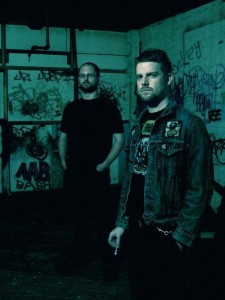 Whilst the band’s last effort placed them (to my mind at least) as the only real successors to the crown of imperial majesty vacated by Emperor, the newest record seems to take a sick pleasure in neatly side-stepping these expectations. The cover artwork suggests the mindset behind the album’s creation, a brutal dissection of both beauty and ugliness, the cutting and separation of certain elements serving to open up new wounds whilst exposing the twisted core of the band’s being. The body of the music is being torn open and dissected, allowing its blackened core to flourish more freely whilst also pulling its limbs ever outwards in different directions.
Whilst the band’s last effort placed them (to my mind at least) as the only real successors to the crown of imperial majesty vacated by Emperor, the newest record seems to take a sick pleasure in neatly side-stepping these expectations. The cover artwork suggests the mindset behind the album’s creation, a brutal dissection of both beauty and ugliness, the cutting and separation of certain elements serving to open up new wounds whilst exposing the twisted core of the band’s being. The body of the music is being torn open and dissected, allowing its blackened core to flourish more freely whilst also pulling its limbs ever outwards in different directions.
As an extension of this idea, the songs on Passion vary stylistically in terms of where they sit upon Anaal Nathrakh’s own particular spectrum of filth and brutality. Some songs go further towards exposing their grindcore roots than we have seen in some time, whilst others soar on blackened wings, while yet more crush and strike with clinical, mechanical efficiency befitting their more industrialised edge.
They have also experimented with some new elements this time around, the presence of guest vocalists adding a different sense of flavour and character to certain songs, shifting the bands dynamic somewhat. There is also a welcome change in the greater incorporation of dirtier electronic elements, pulsing synthetic beats and digital distortion, that all add a new, equally inhuman, element to the sound.
“Violenta Non Fit Iniuria”, “Le Diabolique Est L’ami Du Simplement Mal” and “Paragon Pariah” are the more traditional Anaal Nathrakh songs on offer, incorporating blistering black metal passages, bursts of harsh grindcore, technical guitar ferocity and ihumanly tight, almost mechnical drumming. The vocals scream and bark, growl and roar, seemingly losing themselves at times in an inescapable abyss of torment, only to suddenly thrust skywards in a clear, soaring melody.
Each of these songs deviates from the basic template in subtle ways however; “Violenta Non Fit Iniuria” begins the album with a slow, restrained, melancholy introduction almost totally at odds with the berserker frenzy that follows it. The emphasis on manic falsetto vocals in the chorus is another slight shift in focus, as is the prominent solo section which adds a different flavour to the song than one might expect. Through it all there are subtle undercurrents of the band’s new/rediscovered electronic and industrial elements, dirty, skittering beats and effects utilised to twist the music even further.
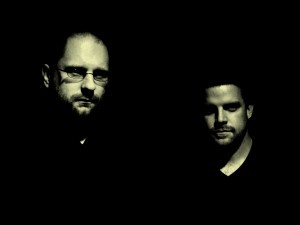 “Le Diabolique Est L’ami Du Simplement Mal” also varies the template somewhat, introducing the track with a surprisingly vibrant and powerful clean vocal refrain proclaiming “we have no intention of being saved”. The riffs are amongst the most catchy and razor-sharp the band has ever conjured, the band erring more on the black metal side of their sound with this track, really capturing that sensation of the urban emperor in the ascendant. The screams remain tortured and crazed in their intensity, while the riffs mine a seam of distinctive melody that only Anaal Nathrakh could truly deploy in such a brutal, yet beautiful manner, breathing a sort of seductive danger with every note.
“Le Diabolique Est L’ami Du Simplement Mal” also varies the template somewhat, introducing the track with a surprisingly vibrant and powerful clean vocal refrain proclaiming “we have no intention of being saved”. The riffs are amongst the most catchy and razor-sharp the band has ever conjured, the band erring more on the black metal side of their sound with this track, really capturing that sensation of the urban emperor in the ascendant. The screams remain tortured and crazed in their intensity, while the riffs mine a seam of distinctive melody that only Anaal Nathrakh could truly deploy in such a brutal, yet beautiful manner, breathing a sort of seductive danger with every note.
“Paragon Pariah” is a bleakly, starkly sublime song which matches its pummeling onslaught of riffs and booming drumming with a strain of sorrowful melody which runs through the whole track. Magnificent in its grandeur, the song also captures a distinctly melancholic mood throughout, particularly in its use of soaring vocal melodies (contrasting perfectly with the harsh, demonic growls of “A great lunatic asylum” which precede each melodic break), aided and abetted in its cause by the prominence of both the rumbling, doom-laden bass lines and screaming yet melodic solo. Out of all the songs on here, I would say this pushes the melodic instrumental side of the band the furthest, yet does so in an unassuming manner, managing to include a surprising amount of subtle variety from the norm in a remarkably short and direct song.
“Drug Fucking Abomination” takes the traditional weapons of Anaal Nathrakh and pushes them towards the breaking point, seeing what can be done with the band’s more pure, core sound by pushing the envelope in a more epic manner. The grandiose instrumental introduction feels more organic and textured than ever before, whilst even when the song bursts into full speed it seems more wilfully constrained than the all-or-nothing extremity we have seen before. Though the insane blast-frenzy and riffing still remain a constant presence, the execution is more restrained and perhaps more considered than ever before. The whole song gleams like a newly minted war machine, heavy (both musically and emotionally) with the promise of destruction and clearly confident in its own inherent superiority, able to take its own time to destroy the listener’s expectations and preconception.
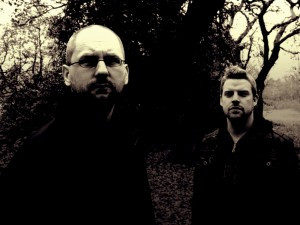 To contrast the more black metal side of the band that has been aired thus far, both “Post-Traumatic Stress Euphoria” and “Locus Of Damnation” provide a shocking form of the band’s unique take on the grindcore template, neither coming close to breaking the 2 minute barrier.
To contrast the more black metal side of the band that has been aired thus far, both “Post-Traumatic Stress Euphoria” and “Locus Of Damnation” provide a shocking form of the band’s unique take on the grindcore template, neither coming close to breaking the 2 minute barrier.
“Post-Traumatic Stress Euphoria” begins with a pulsing industrial beat, before the terrifying grindcore and industrial metal attack commences. As a stunning display of calculated brutality, the song actually feels far longer than its short running time, due to the sheer number of extreme ideas and disparate elements the band is able to include whilst still somehow staying just this side of utterly overwhelming.
“Locus Of Damnation” barely scrapes over the 1 minute mark, focussing on a pure assault of dissonant, grinding guitar and unrelenting drums, over which the phrase “locus of damnation” is screamed again and again. Perversely, the most “human” sounding song on here, the stripped back nature of the song really enhances the feeling of two individuals unleashing their own all too human frustrations and frailties upon the world in one short, cathartic burst.
“Tod Huetet Uebel” is a difficult song. Though the renewed focus on atonal, technical riffage is a new step for the band, I didn’t particularly enjoy this song when I first heard it. Mainly this was due to the guest vocals, which take over all the vocal lines on this song. In contrast to the lethally focussed delivery which Anaal Nathrakh usually prefer, akin to a serial killer with a god complex callously stripping the skin from his victims, the guest vocals here delve into the other side of lunacy, where all control is gone and the subject is condemned to wallow in their own filth and sickness. This lack of control means the vocals can often be particularly off-putting; filthy in their degradation and debasement, these are the vocals of the victim, not the perpetrator, and so lack the vicious strength AN usually deal in. Yet over time they legitimately add something to the album… a different side to the madness if you will. This is a song that will take many listens to truly appreciate.
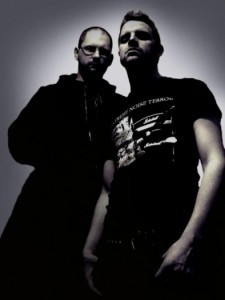 The band places renewed focus on the industrial side with the songs “Who Thinks Of The Executioner?” and “Ashes Screaming Silence”, pushing the envelope in yet another direction. “Who Thinks Of The Executioner?” focuses more on direct aggression and abrasive, inhuman levels of speed and distortion, backed up by some residual elements of Anaal Nathrakh’s blackened hymns of worship.
The band places renewed focus on the industrial side with the songs “Who Thinks Of The Executioner?” and “Ashes Screaming Silence”, pushing the envelope in yet another direction. “Who Thinks Of The Executioner?” focuses more on direct aggression and abrasive, inhuman levels of speed and distortion, backed up by some residual elements of Anaal Nathrakh’s blackened hymns of worship.
The band’s industrial roots are on full display here, the vocals often distorted by effects and abused by electronic influences into unholy, inhuman forms, while the instruments lock into an ominous, robotic groove which assault the senses in a blitzkrieg of explosive detonations. The crackling undercurrent of distorted, industrial noise adds a further element of disturbing horror to the material, matched by the evil grandeur of blackened melody which runs counter to the machine-like rhythms and ominous, crawling bass-lines.
“Ashes Screaming Silence” also continues to play off this devastating attack of martial industrial guitar against some of the more familiar Anaal Nathrakh elements, sudden bursts of tremolo riffing and majestic singing all serving as adjuncts to the more direct, some might say even simplistic, bombardment of percussive guitar and drum interplay.
The song’s unnerving beginning, malignant whispers mixed with the sounds of distant artillery, slowly transforms into a militaristic stomp of pounding industrial guitars and inhuman drumming. The song punishes the listener for several minutes before breaking down into one final assault of its crushing introductory refrain, which demonstrates how even the simplest forms of musical brutality can be even more damaging in the hands of a master. Employed in this manner this simple, pure aggression is devastatingly heavy, its staccato power putting the lie to many other bands claims of heaviness. The controlled slow-down at the end of the song serves to pile on the pressure to unbearable levels, showing that where other bands are loud, Anaal Nathrakh are truly heavy.
“Portrait Of The Artist” ends the album on a strange note, a short piece of buzzing electronic noise which builds steadily in volume and threat, clashing industrial samples and maddeningly twisted strings vying with piercing dissonance, growing and building… before suddenly ceasing, the echoing silence reflecting the twisted beauty and horrific ugliness of the human condition in equal measure.
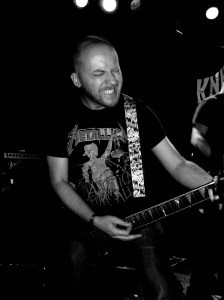 Is it better than In The Constellation Of The Black Widow? I’d say no… but I’d also say that it isn’t striving to be. Instead, it is perhaps the strongest “transition” album I have heard in some time, the band taking a perverse pleasure in side-stepping the expectations conjured by their previous two masterful albums by attempting to widen the remit of their sound again, without losing their core integrity. The boundaries of their sound have not been broken, but they have been quietly and organically expanded, pushing and pulling what Anaal Nathrakh as an entity can be in different, often opposing directions, yet somehow managing to tie them all together at their roots.
Is it better than In The Constellation Of The Black Widow? I’d say no… but I’d also say that it isn’t striving to be. Instead, it is perhaps the strongest “transition” album I have heard in some time, the band taking a perverse pleasure in side-stepping the expectations conjured by their previous two masterful albums by attempting to widen the remit of their sound again, without losing their core integrity. The boundaries of their sound have not been broken, but they have been quietly and organically expanded, pushing and pulling what Anaal Nathrakh as an entity can be in different, often opposing directions, yet somehow managing to tie them all together at their roots.
As such, some of these songs offer a new, vibrant take on the band’s early influences, whilst others push forward in the aim of expanding their current sound more fully. Everything old is new again, and everything new is stronger for it. More than anything, this is an interesting and intriguing album, made all the more so by the undercurrents and background elements that take several listens to pick out and truly appreciate amongst the controlled chaos of Passion.

I’ll never forget my first experience with Anaal Nathrakh almost five years ago. It was thanks to 4Q Radio. I was wide eyed and wet in the pants. These guys are great, and their music definetly reflects their love of the craft.
I’d say that pretty much captures how I felt when I first heard In the Constellation of the Black Widow. I made sure to wear adult diapers before listening to Passion. Good thing I did.